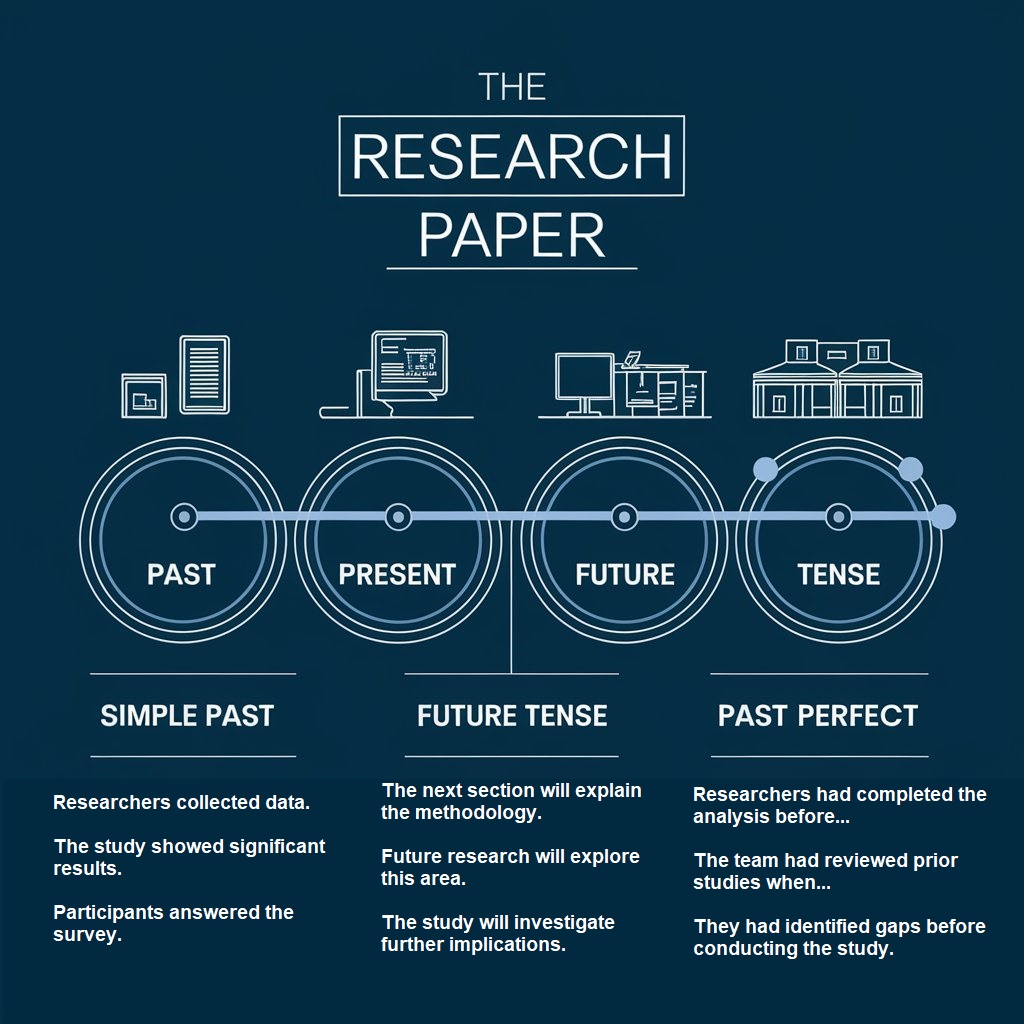Understanding Verb Tense Use in Each Section of a Research Paper
Clear and consistent verb tense usage is essential in academic writing. It helps readers follow the logic of your argument, distinguish between past and present knowledge, and understand the timeline of your research. Below is a detailed explanation of the appropriate verb tenses for each major section of a research paper.
1. Abstract
The abstract provides a concise paper overview, including the research problem, methodology, key findings, and overall conclusions. Since it summarizes different parts of the paper, a variety of tenses is used depending on what is being described:
Example: “This study investigated the relationship between digital media and attention span.”
Example: “The results suggest a significant link between screen time and anxiety.”
Example: “Further research will be necessary to validate these findings in older populations.”
2. Introduction
The introduction sets the stage for your study. It provides background information, states the research problem, and outlines the objectives. Because it deals with a mix of general knowledge and prior studies, multiple tenses are used appropriately:
Present Tense describes current knowledge, widely accepted facts, or theoretical frameworks. These are ongoing truths and are still applicable at the time of writing.
Example: “Cognitive behavioral therapy is a widely recognized treatment for anxiety.”
Past Tense refers to specific research studies or findings from the past. These are completed studies with specific outcomes that occurred in the past.
Example: “Jones and Kim (2017) reported improved outcomes from group therapy.”
Present Perfect Tense: Used to show that past research is relevant or ongoing. This emphasizes continuity and the cumulative nature of prior studies.
Example: “Researchers have investigated the role of sleep in memory retention for decades.”
Future Tense (optional): Used to introduce the aim or scope of your study. Indicates what your research will explore, especially if not stated in the abstract.
Example: “This study will examine how meditation influences academic performance.”
3. Literature Review
The literature review synthesizes prior research and sets the theoretical context for your study. Different tenses are used based on the purpose of each sentence.
It is acceptable and often necessary to mix tenses when discussing a combination of past research findings and present-day theories or interpretations.
4. Methods
The methods section describes the procedures and techniques used during your research. It should consistently use the past tense.
Examples:
“Participants were recruited from three universities.”
“Data were collected via Google Forms.”
“Statistical analysis was performed using SPSS software.”
These actions were completed before the paper was written. Even if you describe common research methods, stick to the past tense because you report what was done in your study.
Common Error: Do not switch to the present tense when referring to routine methods. Even if a procedure is standard in your field, the tense must reflect that it was carried out in the past for your research.
5. Results
This section presents the findings of your study. The appropriate tense depends on whether you report the data or refer to figures and tables.
Past Tense: Used to report the actual results or outcomes observed during the study.
Example: “Students who slept more than eight hours scored higher on memory assessments.”
Present Tense: Used to describe what is shown in visual elements such as tables, charts, or figures. Data collection and analysis occurred in the past (past tense), but the visuals exist in the paper now (present tense).
Examples:
“Table 2 shows the distribution of response times.”
“Figure 1 illustrates the trend in attention span by age group.”
6. Discussion and Conclusion
These sections interpret your findings, relate them to previous research, and suggest directions for future study. Each type of statement requires a specific tense:
Use the present tense to convey interpretations and ongoing implications.
Use the past tense when describing specific results from your research.
Use the present perfect to show how your findings align with a body of prior work.
Use the future tense to suggest what should come next in the field.
Special Cases and Exceptions
1. Describing Figures, Tables, and Graphs
Always use the present tense when referring to visual elements in the current paper.
These visuals are part of the present document and are being actively referenced.
Examples:
“Figure 3 illustrates weekly fluctuations in attention span.”
“Table 4 summarizes participant demographics.”
2. Hypothetical or Speculative Statements
Use conditional forms to describe imagined outcomes, theoretical scenarios, or alternative possibilities.









 Evan John
Evan John